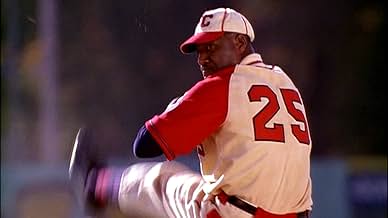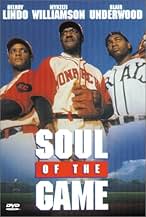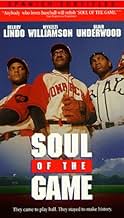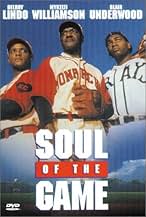AVALIAÇÃO DA IMDb
7,4/10
1,1 mil
SUA AVALIAÇÃO
Adicionar um enredo no seu idiomaBlack baseball greats, Satchel Paige and Josh Gibson, vie to be the first afro-American major leaguer, only to see the outspoken rookie, Jackie Robinson, be chosen.Black baseball greats, Satchel Paige and Josh Gibson, vie to be the first afro-American major leaguer, only to see the outspoken rookie, Jackie Robinson, be chosen.Black baseball greats, Satchel Paige and Josh Gibson, vie to be the first afro-American major leaguer, only to see the outspoken rookie, Jackie Robinson, be chosen.
- Prêmios
- 4 indicações no total
Salli Richardson-Whitfield
- Lahoma
- (as Salli Richardson)
- Direção
- Roteiristas
- Elenco e equipe completos
- Produção, bilheteria e muito mais no IMDbPro
Enredo
Você sabia?
- CuriosidadesStadium is same stadium which served as the home field for the Rockford Peaches in "A League of Our Own." Now called League Stadium, it is located in Huntingburg, Indiana.
- Erros de gravaçãoAt the end of the movie, in the Negro League vs. Major League All-Star Game, played in 1945, there is a 50-star flag on the flagpole (two close-up shots). In 1948 it should have been a 48-star flag.
- ConexõesReferenced in The 18th Annual CableACE Awards (1996)
Avaliação em destaque
Kevin Rodney Sullivan uses this masterpiece of a cable movie to build his resume for his entre into feature film directing ("How Stella Got Her Groove Back"). HBO Pictures' faith in the young actor/director, who to date has very few credits as either, is justified.
The year is 1945. Everyone knows that soon, the Major Leagues will be integrated. Most think the player who breaks the "color line" will be an established Negro Leagues star, such as legendary hurler Leroy "Satchel" Paige of the Kansas City Monarchs or Homestead Grays' catcher Josh Gibson, who was called "the black Babe Ruth." But Dodgers General Manager Branch Rickey confounds the experts and chooses the confrontational but cerebral Jackie Robinson first.
Delroy Lindo, an unheralded but talented character actor ("Broken Arrow," "Get Shorty," "Malcolm X," "Crooklyn") shows true leading man potential as Satchel Paige in this engaging story about the struggle for Negro League stars to make it to the "big leagues" in the mid 1940s. Mykelti Williamson ("Forrest Gump," "The New WKRP in Cincinnati," "Midnight Caller") is excellent as Josh Gibson. Blair Underwood ("L.A. Law"), a fine actor, seems physically miscast as Jackie Robinson, but turns in a credible performance as the future Brooklyn Dodger second baseman and Hall of Famer. Edward Herrmann ("Richie Rich" and Dodge automobile pitchman) is properly pontifical as Rickey, and an excellent facial match, although he is much taller and more nattily attired than "The Mahatma" was in real life. Venerable character actor R. Lee Ermey ("Full Metal Jacket") steals a couple of scenes in his role as J. L. "Wilkie" Wilkinson, the visionary Kansas City Monarchs owner who, among other innovations, invented night baseball.
The story is mostly entertainment, a docudrama. It is a sumptuously photographed period piece with clothes, cars, ballparks, and hotel lobbies perfectly festooned in the style of the day. As a character study, it is flawed. Paige, while portrayed as the consummate showman he was, is also shown as a devoted husband whose wife Lahoma (Salli Richardson) travels everywhere with him. The real life Paige was a notorious womanizer. And although there are many scenes with Gibson and Robinson together, including a near-fight that probably never happened, in reality, there is no evidence to suggest that Gibson and Robinson ever met each other. The screenplay also glosses over Gibson's well-documented alcoholism and heroin addiction, suggesting that the brain tumor which eventually killed him at the tender age of 36 was the sole cause of the bizarre behavior that kept him from being the first African-American selected to play in the majors.
The movie also has fictional scenes at the beginning and end where a newspaper reporter talks to Willie Mays during the 1954 World Series before the young Giants outfielder goes out and makes "the catch" of Vic Wertz's blast in Cleveland's Municipal Stadium. It is also convenient how many times the juvenile Mays seems to pop up in opportune moments as a spectator or autograph seeker during the film. One such scene was used to make the point that his father, Cat Mays, had been a standout in the Negro Leagues long before baseball integration was a remote possibility, and also to get Robinson--and the audience--to question how old Paige really was at that point.
On the other hand, the film does a creditable job of showing how tough times were for Negro League ballplayers and how eager most were to be accepted into so-called "organized baseball," despite the Jim Crow laws and attitudes of the day. There is a shocking and touching scene where a clueless young fruit vendor repays the kindness of Mr. and Mrs. Paige by calling them the ugliest racial epithet used against African-Americans.
As entertainment, "Soul of the Game" deserves an "A." As a historical document, it is about a "C." That's "C" as in "see it."
The year is 1945. Everyone knows that soon, the Major Leagues will be integrated. Most think the player who breaks the "color line" will be an established Negro Leagues star, such as legendary hurler Leroy "Satchel" Paige of the Kansas City Monarchs or Homestead Grays' catcher Josh Gibson, who was called "the black Babe Ruth." But Dodgers General Manager Branch Rickey confounds the experts and chooses the confrontational but cerebral Jackie Robinson first.
Delroy Lindo, an unheralded but talented character actor ("Broken Arrow," "Get Shorty," "Malcolm X," "Crooklyn") shows true leading man potential as Satchel Paige in this engaging story about the struggle for Negro League stars to make it to the "big leagues" in the mid 1940s. Mykelti Williamson ("Forrest Gump," "The New WKRP in Cincinnati," "Midnight Caller") is excellent as Josh Gibson. Blair Underwood ("L.A. Law"), a fine actor, seems physically miscast as Jackie Robinson, but turns in a credible performance as the future Brooklyn Dodger second baseman and Hall of Famer. Edward Herrmann ("Richie Rich" and Dodge automobile pitchman) is properly pontifical as Rickey, and an excellent facial match, although he is much taller and more nattily attired than "The Mahatma" was in real life. Venerable character actor R. Lee Ermey ("Full Metal Jacket") steals a couple of scenes in his role as J. L. "Wilkie" Wilkinson, the visionary Kansas City Monarchs owner who, among other innovations, invented night baseball.
The story is mostly entertainment, a docudrama. It is a sumptuously photographed period piece with clothes, cars, ballparks, and hotel lobbies perfectly festooned in the style of the day. As a character study, it is flawed. Paige, while portrayed as the consummate showman he was, is also shown as a devoted husband whose wife Lahoma (Salli Richardson) travels everywhere with him. The real life Paige was a notorious womanizer. And although there are many scenes with Gibson and Robinson together, including a near-fight that probably never happened, in reality, there is no evidence to suggest that Gibson and Robinson ever met each other. The screenplay also glosses over Gibson's well-documented alcoholism and heroin addiction, suggesting that the brain tumor which eventually killed him at the tender age of 36 was the sole cause of the bizarre behavior that kept him from being the first African-American selected to play in the majors.
The movie also has fictional scenes at the beginning and end where a newspaper reporter talks to Willie Mays during the 1954 World Series before the young Giants outfielder goes out and makes "the catch" of Vic Wertz's blast in Cleveland's Municipal Stadium. It is also convenient how many times the juvenile Mays seems to pop up in opportune moments as a spectator or autograph seeker during the film. One such scene was used to make the point that his father, Cat Mays, had been a standout in the Negro Leagues long before baseball integration was a remote possibility, and also to get Robinson--and the audience--to question how old Paige really was at that point.
On the other hand, the film does a creditable job of showing how tough times were for Negro League ballplayers and how eager most were to be accepted into so-called "organized baseball," despite the Jim Crow laws and attitudes of the day. There is a shocking and touching scene where a clueless young fruit vendor repays the kindness of Mr. and Mrs. Paige by calling them the ugliest racial epithet used against African-Americans.
As entertainment, "Soul of the Game" deserves an "A." As a historical document, it is about a "C." That's "C" as in "see it."
- johnnyb-10
- 30 de ago. de 1999
- Link permanente
Principais escolhas
Faça login para avaliar e ver a lista de recomendações personalizadas
Detalhes
- Data de lançamento
- País de origem
- Idioma
- Também conhecido como
- Baseball in Black and White
- Locações de filme
- Empresas de produção
- Consulte mais créditos da empresa na IMDbPro
Contribua para esta página
Sugerir uma alteração ou adicionar conteúdo ausente

Principal brecha
By what name was Os Campeões (1996) officially released in Canada in English?
Responda



































